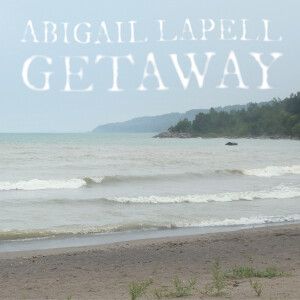 Toronto-based singer, songwriter and multi-instrumentalist Abigail Lapell follows up her Canadian Folk Music award-winning sophomore album Hide Nor Hair with Getaway. It is a remarkably mature record — both musically and emotionally — for a young musician cutting her third album.
Toronto-based singer, songwriter and multi-instrumentalist Abigail Lapell follows up her Canadian Folk Music award-winning sophomore album Hide Nor Hair with Getaway. It is a remarkably mature record — both musically and emotionally — for a young musician cutting her third album.
The first thing I checked out on this album was Lapell’s lovely duet with fellow Canadian singer-songwriter Dana Sipos on “Down By The Water,” tucked unobtrusively in to the album’s final third. Sipos’s Trick of the Light was one of my favorite albums of 2018, and the meeting of Lapell’s prairie noir with Sipos’s Appalachian avant-garde is enchanting though low-key. As I listen to this one, I can’t stop thinking of Cat Stevens. Lapell has a gift for phrasing … It’s a magical moment on an album that is full of such moments.
In her relatively short but already quite eventful career, Lapell has performed around the world, toured by bike, canoe, and train, shared a Montréal apartment with Merrill Garbus, the New England avant-folkie who performs as tUnE-yArDs, and held writing residencies across North America. All that traveling and such has definitely given her music a certain complexity often lacking in the genre.
All that traveling also contributes to the central theme of Getaway, whether it’s lovers being unfaithful or otherwise fleeing relationships, musicians putting in long hours on the road between shows, or more symbolic forms of leaving.
Lapell opens with “Gonna Be Leaving,” a song that’s deceptively simple on the surface but the closer you listen becomes more complex, musically and, especially, emotionally. The steady, almost calm cadence of the melody, which has no dramatic ups or downs but remains firmly in the mid-range, reflects the singer’s similarly deceptive outward equananimity. But underneath she’s seething with bottled anger at her partner who keeps threatening an end to the relationship. Sipos and Lisa Bozikovic (who also plays piano) contribute intricately phrased harmony vocals that add to the song’s air of melancholic mystery.
Continuing with the theme of leaving, “Halfway To Mexico” is a bluesy shuffle about the difficulty of maintaining relationships on the road. This one has a simple arrangement with Lapell on guitar, accompanied by Christine Bougie on lap steel guitar and Jake Oelrichs behind the kit. “Ask Me No Questions,” a laconic meditation on her disappointment with members of the opposite sex, is an even simpler arrangement of fingerpicked acoustic and steel guitar — short and bittersweet, the length of an old-fashioned pop song, Lapell’s crystalline and hopeful voice belied by the weeping tones of that steel guitar.
“Devil In The Deep,” on the other hand, is a fully orchestrated rocker, with some mean guitar by Lapell and serious fiddling by Rachael Cardiello on viola as well as vocals. This one is real old-school, 70s-style gospel-tinged folk, with Lapell fully immersing herself in religious imagery to tell her tale of what seems to be the loss of a loved one. It’s not a physical loss through death, probably, but a stealing away through deceit.
Lapell garners comparisons to Sandy Denny, and “Sparrow For A Heart” is a good example of why, both lyrically and sonically. In addition to some of her sweetest vocals on the album, this chamber-folk number features Lapell on all the instruments except for Rebecca Hennessey’s trumpet, which plays startling harmonies with Lapell’s synth flute.
Producer Chris Stringer has been working with Lapell since 2016’s Hide Nor Hair. Here he finds lots of wonderful settings for Lapell’s lyrics and the way she delivers them, often giving her a reverb that suggests big open spaces, as in “Little Noise,” which features a trumpet and trombone in an arrangement that creates some very interesting harmonies with her electric guitar. And a synthesizer adds spooky atmosphere to “UFO Song,” a dark ballad of someone convinced — and terrified — that they’ve seen an alien visitor. Was this one inspired by listening to AM talk radio on those long nights on the road?
The pivot point of the album is “Runaway,” which Lapell sings alone, her multi-tracked vocals accompanied only by herself on accordion. The intro, played on the instrument’s deep, low keys, is delicious, as are her vocals, as she drives home the album’s theme, asking a loved one if he’s going to go or stay: “Do you really want to run-run-run away?”
But don’t you run away — make sure you stay to the end so you catch the last song, which I find is often one of the most important on a record. “Shape Of A Mountain” is a languid ballad, with Lapell’s jazz-worthy phrasing and her fingerpicked electric augmented by pedal steel, cello and violin. It’s a startling arrangement that perfectly sets the song, a portrait of her inner life:
“The rain in the desert, the frost on the vine
All the seasons have their reasons
And I have mine.”
Elizabeth Lapell is a major new voice on the singer-songwriter scene. With Getaway she has created the first great contemporary folk album of 2019.
(Coax, 2019)
